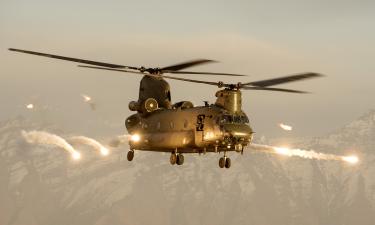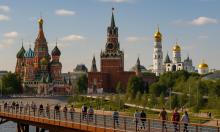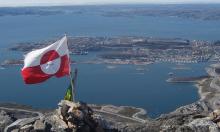Soviet Project for Siberian Rivers Diverting to be Revived?
This is not ruled out that very soon the Soviet project for diverting of the Siberian rivers will be revived. Some scientists say that today the idea doesn't sound absurd at all
At an international conference "Transboundary water resources: protection and ecological stability strategy" held at Akademgorodok last week the idea of diverting the Siberian rivers of Ob and Irtysh to Central Asia was touched upon once again. The issue was actively initiated by journalists which seems to be quite logical after the last year's speech of Moscow Mayor Yury Luzhkov on the same subject. He said that in the 21st century the price for water would be on a continuous rise and it might even exceed, he said, the oil price. Yury Luzhkov added that as far as Russia had abundant water resources it was reasonable to consider the Soviet project of diverting Siberian rivers to Asian republics to earn money through realization of the project.
The idea voiced by the Moscow mayor had a great response in the society; however the people treated it rather as a political action taken to stir up the electorate. But Uzbekistan President Islam Karimov has quite a different point of view upon the problem. In May 2001, during his visit to Moscow and meetings with Russia President Vladimir Putin he also spoke about the idea of using the water of Siberian rivers for irrigation of the arid Asian territories. Tajikistan President Emomali Rakhmonov, the head of the International Aral Salvation Foundation, also supports the project and supplies his opinion with statements made by experts. Experts say that the annual ejection of 1 million tons of salt may cause a global environmental catastrophe.
An engineering hydrosystem developed by Soviet scientists in the 1960-70s was called Sib-Aral. It was supposed to become a canal to transport water from the Ob River (it was supposes that 5-7 per cent if the river's flow will go along the canal) from the city of Khanty-Mansiisk to the territories of the Amudarya and Syrdarya Rivers, as a result the water was to follow to the Aral Sea that was getting too dry. According to the project, the length of the canal was expected to be over 2,000 square meters, the width - 200 and the depth - 16 meters. The total expected volume of transportation was to make up 25-27 cubic kilometers per year. It makes no sense to report now what agricultural growth was expected to be achieved as a result of the irrigation of the Asian territories. However, it is important that all leaders of the Soviet Asian republics supported the idea of the canal construction.
Professor Eingorn from Tashkent's Scientific Information Center of the Inter-state Water Commission spoke at the conference: "We have estimated that even if large investment is done to reconstruct the already existing irrigation systems, the agriculture of the republic will be able to develop not further than 2015-2020. It's scary to imagine what may happen to Uzbekistan next. This may be even settling of the people and global migration. Against the background of rapid increase of the population (within the past 20 years Uzbekistan's population increased by 17 million people) the amount of irrigated territories is reducing. It has reduced from 0.4 to 0.18 hectares per head. This is awful for the republic. Experts say that Uzbekistan must have this norm at the rate of 0.3 hectares per head to have normal food supply in the republic. You may cite the example of Japan here: the country guarantees a very high living standard of the population although it has just 0.04 hectares of irrigated territories per head.
The high living standard in the country is explained with production of high-end products. This is unfeasible for Central Asia, at least now. It's difficult to suppose how the problem can be settled.
We are recommended to spend water economically and cited the example of Israel where even drops of water go through pipes to every plant. However, the situation in the republic differs from Israel seriously; the moisture deficit here is much higher. Experiments on drip irrigation held in the republic have brought no success.
If we suppose that we use the water of Siberian rivers we might solve many problems here in Uzbekistan. However this is just an illusive idea only. Under the Soviet Union all republics had common financing and agricultural production yielded earnings to the common budget. Today each of the former Soviet republics has its own budget. The Moscow mayor suggests considering the project in a different aspect; he says that water of Siberian rivers can be given to Central Asia republics for money. He is right from a market point of view as every country earns money in commerce. Luzhkov is trying to sell water as this commodity is wanted somewhere. If we take the problem from this point of view then Russian organizations should develop a project, estimate its payback, the feasibility and consider how the commodity (water) can be sold. Then Central Asia countries will decide whether they like the project or not; first of all this concerns the cost of the product which is quite a problem in fact. If we take into consideration today's economic level of Central Asia countries, it becomes perfectly obvious that they won't be able to pay for the project. And this is not because of the project's cost. To get water from Russia, Uzbekistan would have to pay to Kazakhstan for transportation of the water along its territory. What is more, there is a number of technical problems as well.
It's a pity that the project was rejected in the Soviet era. It was not that important to start construction of the canal; but at least the problem required a thorough study. Some money has been spent on the project all the same; people should have invested a bit more to complete the study of the issue."
It was the Soviet Communist party central committee that issued a decree to cease further work. At that very period the authorities focused on active development of oil and gas fields, construction of the BAM (the Baikal-Amur railway). But in fact, environment activists contributed a lot into closing of the project. The press published opinions that were quite different to those saying how Central Asia republics may flourish as a result of the canal construction. For example, it was stated that half of water supplied through the canal would be lost while transportation; it was also said that if water was taken from the Irtysh River for Asia the river would be seriously damaged.
However, even today opinions about environmental consequences that construction of the canal might bring are quite different.
Academician Oleg Vasilyev from the Institute of Water and Ecology Problems in the Russian Academy of Sciences in Siberia says: "The idea to take a portion of water from Siberia and deliver it to Asia looks quite natural to me. Many projects of this kind are being carried out in the world. It was said in the press that the project supposed diversion of the Siberian rivers, but in fact the project meant to take just 5-7 per cent of the rivers’ flow within a low-water period. The hydro-energy changes of the Ob and Irtysh Rivers were strictly limited. A number of research institutes studied the impact upon theeco system parameters. The Soviet State Nature Management Committee studied the project; the Siberian department of the Soviet Academy of Sciences also worked on the project. A special commission of about 70 experts worked on the project and submitted the results of their work for consideration of the Academy's presidium. A conclusion given by the presidium wasn't very skeptical but rather serious. From the ecology point of view experts were anxious about the hydraulic impact upon the Arctic. However, it was rather local: transfer of 25 cubic kilometers of water is a small portion for the Ob River, not to speak about the ocean.
If the project is to be taken up today it should be done on a quite different level. It is important not to try and improve the Aral Sea situation as it was planned in the Soviet era, but to give more water for irrigation. The project must be considered once again. Sooner or later people will get back to the problem once again. The idea voiced by the Moscow mayor is not that stupid as it seems to be at first. Time will come when transportation of water from the Siberian rivers will be paying."
At the same time, chairman of the Siberian department of the Russian Academy of Sciences, Academician Nikolay Dobretsov is rather categorical about the idea of transporting water from Siberia to Central Asia. "The project makes no sense. Scientists from the Academy's Siberian department don't support it." At the same time, there are scientists who do support the project.
Director of Moscow's Ecoterra Center for Environmental Studies, Professor Nikolay Grishin says: "The project for delivery of water from the Ob and Irtysh Rivers in Siberia to Central Asia is unique regarding its scale and the level of development work. It's a good example of strategic ecological evaluation. In the Soviet era the term wasn't used. It was applied several years ago in the EU countries; it means ecological evaluation of the impact upon environment in every particular program or plan. The project in question was this kind of program supposing construction of a wide range of hydraulic constructions.
In the framework of the project several variants were considered and ecological consequences of the work were estimated. Even if we consider the project from the point of view of today's scientific development, that was and is the world’s largest project containing strategic ecological evaluation. Such detailed research has never been held either in this country or abroad.
Nowadays the problem is that the project hasn't undergone an ecological expertise which is obligatory according to the law adopted in 1995. The project has absolutely no financial basis. Who is to pay for researches if some new facts are searched for? In fact, this is impossible to obtain some data now as the monitoring system has been lost. To make such an important decision experts must have precise information about the present-day condition of the ecological system. I cannot name scientists who absolutely support the project. However, I say it's very important to get back to consideration of the project once again. The project is invaluable scientific material. It is very interesting from a scientific point of view and could help develop methods to estimate the scale of ecological impact.
It is not ruled out that scientists may revive the project in several years. Experts have estimated that by the year of 2025 two thirds of the planet's population will experience the water deficit. It is not ruled out that the project will be given its second life then."
Subscribe to Pravda.Ru Telegram channel, Facebook, RSS!




